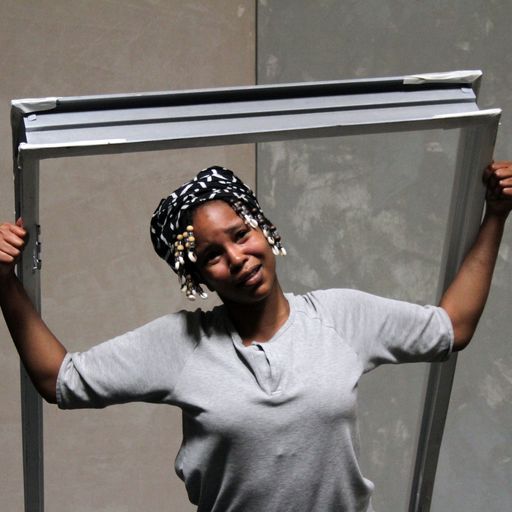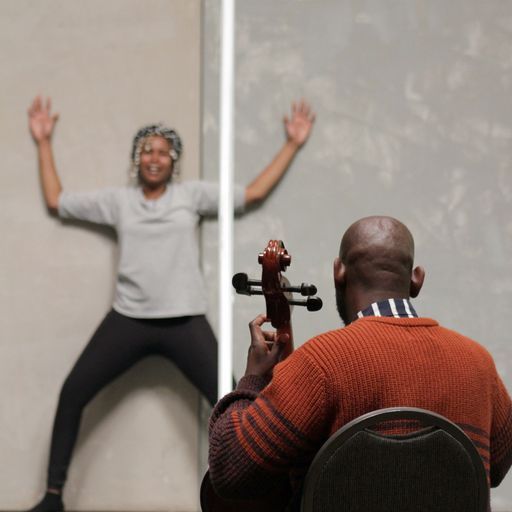SLINDILE MTHEMBU
AI and documenting black women's lived experiences: Creating future awareness through AI-generated sonics and interpretive movement for the future of freeing suffering caused on black bodies.
Igama lami ngingu (my name is) Slindile Mthembu. I am Black. I am a woman. I am a playwright, a director of theatre, creative producer, and a theatre-maker. At the intersections of gender, race, class, and artistic profession, I exist within a historically male-dominated industry, as well as experience multiple levels of oppressive structures that have excluded and muted the voices of many of those who look like me, resulting in unequal opportunities. It is, for this reason, I do what I do. To be part of Black women who have worked hard to have their voices heard so that these voices are part of history.

As a result..in my enrolment as a MA student in the theatre and performance department, I was required to script a new contemporary South African experimental play IGAMA? (2020) narrates the story of five women who live in a well-behaved South African community. The aim is to see if the women can break out of the stereotype or whether they conform to the boxed post-colonial South African Society. The work has been an ongoing investigation on the collective memory, trauma and identity that the black body carries and what it means for the black body to release/open up about the intersectional memories of violation—as a response to retrieving the articulation of embodied memories through the representation of the complex, racialized, sexualized dissection of the black moving body. This investigation gazes at ways in which the black body negotiates through interpretive movement how to get rid of the memories and the unwanted identity that women live with every day.
This investigation seeks to investigate the past, present and possible futures for black womanhood and the ways black (women’s)bodies as sites, as land, loaded with memory, prepare for these futures. This idea is to now see how a body loaded with memory survives and tells its histories; how the body as site—with embodied memory, is complicated and transposed sonically; where we challenge the non-linear form of storytelling as has been my ongoing praxis, and its importance to understanding the complex lived experience of black womanhood living in a post-colonial society.


My argument is that the linear structure or one-dimensional narratives depicting black women and their intersectional lives serves no value in categorizing the complex experiences of black women living in South Africa and is a far too limiting structure because thinking and existing for the black female being is multi-layered: in thinking about race you also speak about gender, which means you also speak about economics and access, which also means you speak about the platform and reach, etc. I argue that the intersectional lived experiences of Black womanhood cannot function within a rigid (beginning, middle, and end) playwriting structure, because this limiting form forces the black woman to be depicted through a one-dimensional experience when black women’s experiences are multi-layered, nuanced, complicated, and should be structured within a six-dimensional experience that reflects the Black women’s identity as a form of resistance to refuse remaining muted, othered, and oppressed.
This investigation through the digital arts space, will therefore argue why black women’s multidimensional reality cannot be viewed through a single, rigid, and fixed linear narrative. The multiple dimensions through technology—using projections, will be used to evaluate black women’s interconnecting oppression visually. Through this essay, I am looking to further explore how the tension that is carried through the feminine body passes through the arch of simultaneity, which can be better categorized as the six mountains that Molara Ogundipe-Leslie (1994:9-25) characterizes as the black women’s interconnecting experience, with oppressive metaphoric structures of six mountains placed on a black woman’s back; tradition, Backwardness to do with colonization, race, patriarchy, the global order and lastly and most importantly, herself. Ironically with all the hardship that we as black women endure, we can move with the six mountains on our backs. The black women’s experience, intersecting inside theatre spaces, is enabling women to know that they are not alone. As black women, we need to fight against the injustices caused by the interconnecting oppression we experience. Even if the mountains are heavy and leave a mark, these marks are left as a symbolism to free our foremothers from issues they couldn’t historically stand against.
The aim of this essay is to further investigate how to use AI techniques to document/record the past, present and possible futures for black women living in South Africa and how our bodies as sites, as land, loaded with memory, prepare for these futures. As an attempt to create awareness of the multiple oppressions caused by rape, victimization, prejudice, women abuse, sexual violence, race, and patriarchal constraints.
Therefore, I am fascinated by the relationship of memory, and how AI can document the collective memories of trauma that women have experienced on all three different levels i.e gender, race, and class. The idea is to record myself and use the filmed version of IGAMA? who give consent to speak about their lived experiences as a case study to further create awareness of black womxns lived experiences in a post-colonial South Africa. Speak through the issues regarding gender-based violence. Using the work as a visual case study to create awareness.
In the recordings, I am attempting to use AI sonic interpretation and deep motion tracking to enhance the collective memory of black womanhood as a reaction against structuralism on stage, as a rebellious act that argues why the complexities of the black womxn’s lived experience onstage cannot be confined into a rigid/linear structure.
Editor’s notes: Further investigations and explorations
Human-AI Collaboration in Performing Arts
Audio on this page by Thembinkosi Mavimbela, OpenAI’s MuseNet, Google’s Magenta.
Motion capture and body tracking by Deepmotion AI


